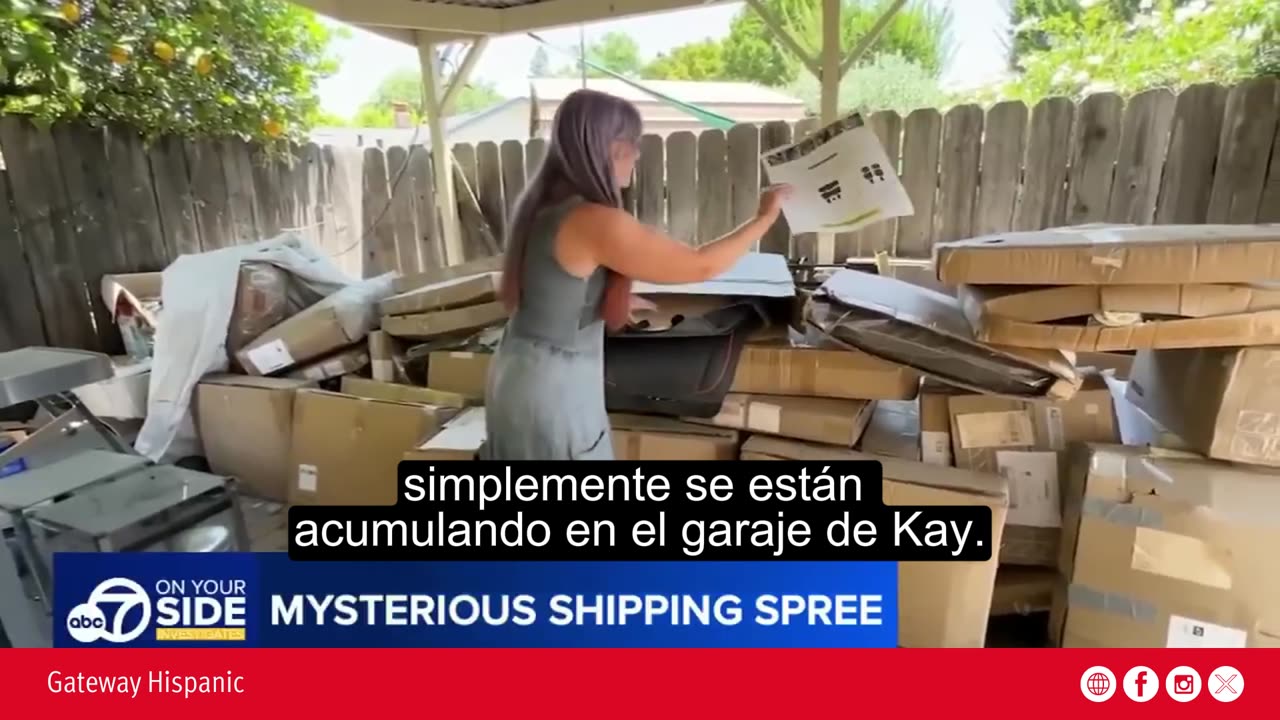Premium Only Content

Amazon Flooded Her Home for a Year—and Did Nothing Until It Made the News
For over a year, a 67-year-old woman lived a modern-day nightmare inside her own home. Her only “crime”? Being involuntarily inserted into the logistics chain of a Chinese seller operating on Amazon. Kay, a longtime resident of San José, became the unwilling recipient of hundreds of identical packages —filling half her garage, blocking access to her house, and endangering her 88-year-old disabled mother.
Each package contained the same item: faux-leather seat covers sold under the name Etkin Seat Covers by a foreign vendor called LiuSanSan. This situation has exposed serious gaps in Amazon’s control over foreign sellers—gaps that left an innocent American citizen paying the price.
A Story of Neglect, Bureaucracy, and Corporate Apathy
What began as a bizarre occurrence quickly became a full-blown crisis that disrupted the life and safety of an entire household. Confused by the arrival of packages she never ordered, Kay filed multiple formal complaints with Amazon. In total, six reports were logged, all promising the same thing: “This will stop.”
But it didn’t. Every month, without fail, more boxes kept arriving. And Amazon’s response? A corporate shrug, suggesting she donate, give away, or return the products herself—as if she were responsible for the mess.
“Every time I called, they said they’d fix it. But more boxes just kept coming. It felt like living in a cruel joke,” Kay said.
The Bigger Problem: Foreign Sellers, Zero Accountability
At the heart of this story is a systemic failure within Amazon’s marketplace: a loophole that allows foreign vendors to exploit American logistics infrastructure without consequences.
According to Amazon’s stated policies, international sellers must issue refunds without requiring a return, or provide prepaid international return labels within two days. But in practice, this rarely happens.
In Kay’s case, the Chinese vendor never responded, and what’s worse—used her home address as a return center. That meant unhappy customers from across the U.S. were sending returned items straight to her garage.
With over 40% of reviews marked one-star, LiuSanSan is a clear example of how some sellers are abusing the Amazon platform as a shield, leaving everyday Americans to deal with the fallout.
Amazon’s Long Silence
What’s perhaps most disturbing is how Amazon—one of the wealthiest, most powerful companies on the planet—ignored this for over a year. A company capable of launching rockets and pioneering AI was either unwilling or unable to stop a rogue seller from misusing one woman’s home.
After being contacted by ABC 7 News, Amazon finally issued a statement:
“We appreciate the attention to this matter, apologize to Kay, and are working with her to retrieve the packages and take permanent action.”
Only after the issue went public on national TV did Amazon take action. Within days, the company removed all packages from Kay’s property and pledged to prevent similar abuse.
One Woman’s Fight for Dignity and Common Sense
For Kay, the ordeal ended in relief, but also served as a harsh wake-up call: in today’s digital economy, ordinary Americans are often on their own against massive tech platforms. And only when the media gets involved does anyone listen.
“I’m eternally grateful to the ABC 7 team. They were the only ones who listened when Amazon ignored me. I finally felt heard,” Kay said, visibly moved.
This story is not just about one woman—it’s about a system that leaves consumers exposed to predatory practices, with little recourse unless they manage to go viral or attract a reporter’s attention.
Conclusion: Who’s Really in Charge of the Tech Titans?
Kay’s case is a warning to every Amazon user: this could happen to anyone. Big Tech, for all its innovation, is increasingly shielding foreign vendors while abandoning the consumers who built its success.
It’s not enough to apologize after public outcry. Proactive systems must be put in place to protect American families from being victimized in their own homes.
This isn’t just a customer service failure—it’s a national concern. The FTC, Congress, and consumer advocacy groups must step in, before more Americans find themselves caught in similar nightmares.
Because today, it was Kay. Tomorrow, it could be you.
-
 56:24
56:24
DeVory Darkins
12 hours ago $41.91 earnedFederal Judge issues shocking order against Trump as Chicago Mayor pulls insane stunt
105K320 -
 1:43:56
1:43:56
Badlands Media
10 hours agoBaseless Conspiracies Ep. 153
34.4K16 -
 23:51
23:51
Stephen Gardner
3 hours ago🚨Trump did the UNTHINKABLE!
26.7K78 -
 2:54:14
2:54:14
Barry Cunningham
6 hours agoBREAKING NEWS: PRESIDENT TRUMP SAYS HE MAY INVOKE THE INSURRECTION ACT! AND NOW WE KNOW WHY!
32.3K14 -
 40:13
40:13
Clownfish TV
12 hours agoMagic the Gathering Champion BANNED from Tournament Over MAGA Hat?! | Clownfish TV
18.5K19 -
 2:49:47
2:49:47
TimcastIRL
5 hours agoTrump Considers Invoking INSURRECTION ACT To Deploy National Guard to Portland | Timcast IRL
171K91 -
 10:05:38
10:05:38
Dr Disrespect
13 hours ago🔴LIVE - DR DISRESPECT - BLACK OPS 7 - GIVE ME BACK MY NUKE
141K17 -
 LIVE
LIVE
Drew Hernandez
3 hours agoTARGETED LEFTIST TERRORIST ATTACK IN CHICAGO & ISRAEL GEOFENCING U.S. MEGA CHURCHES
951 watching -
 8:58
8:58
Degenerate Jay
14 hours ago $0.63 earnedXbox Game Pass Is Getting Ridiculous
14K2 -
 7:03
7:03
GBGunsRumble
1 day agoGBGuns Range Report 05OCT25
9.17K2
